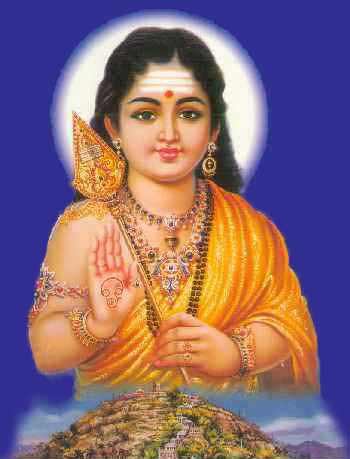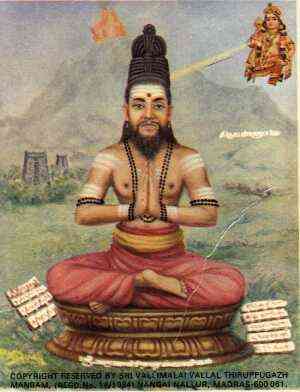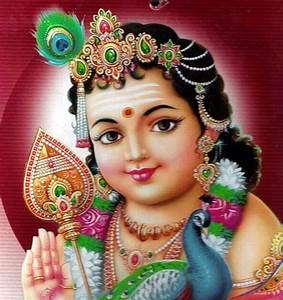
Apart from the garland of songs which Arunagirinathar has weaved and offered as Thiruppugazh, he has also made beautiful garland of hymns to adore Muruga. While the garland of songs hailed the Lord and sought His grace, the garland of hymns like Kandhar Anubhuti revealed his own experience of having received the grace. While the hymn Kandhar Alamgaram described the infinite qualities of Muruga, the Vakuppu described the Lotus Feet of Lord Muruga as the ultimate refuge of all devotees. Here, we make a bird’s eye view of these works:
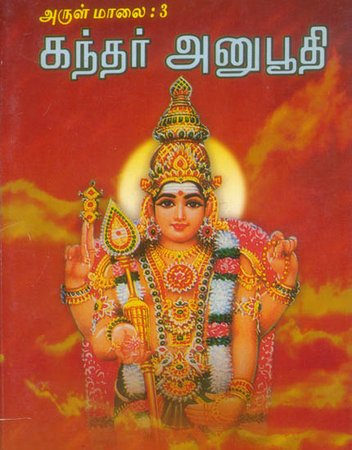
Kandhar Anubhuti: Experience is something personal. What one experiences cannot be explained to another. However, the devotees are blessed that Arunagirinathar could share with them some of his divine experience in the form of Kandhar Anubhuti. In his song on Arumuga temple of Kuthalam, the saint-poet said that the Lord had invited him and blessed him to sing the Anubhuti so that devotees can draw inspiration from it and lead a life of truth and righteousness. (Adaikkala Porulam Ena Enai Azhaithu Muthiyadham Anuboothi Ena Arut Thiruppugazh Othuka). Kandhar Anubhuti is significant in another respect. While other songs of Arunagirinathar which loud the glory of Muruga, his abode, his weapon (Vel), transport (Mayil) and rooster (ensign) are objective in nature, Kandar Anubhuti, which speaks of Arunagiri’s own experience is subjective.
Lord Muruga appeared before Arunagirinathar as Guru and gave the advice on the eternal truth. Arunagirinathar says that as a result of this advice, he was elevated to a new state of consciousness where silence alone prevailed. “Oh Muruga, by your grace, I could go through a new experience of speechlessness.” (Nesa Muruga Ninathu Anbu Arulal… Pesa Anubhuti Piranthathuve (28). In another verse, he thanks the Lord for considering him fit enough to impart this rare advice. (“Aridhakiya Mei Porulukku Adiyen Urida Upadesam Unarthiyava”).
Kandhar Anubhuti, consisting of 52 verses is the quintessence of all the works of Arunagirinathar. It is the crest jewel, the gate-way to Jnana; the way to the path of liberation. As the narration of all the 51 verses of Kandhar Anubhuti would run into several pages, we confine within three verses and attempt to understand their meaning. The very opening lines of Kandhar Anubhuti which is a work of Jnana, underline the importance of devotion. After paying obeisance to Lord Ganesa, Arunagirinathar prays “Oh! God, give me such an avocation in life that I always sing your glory” (Padum Paniye Paniyai Arulvai.”) The essence of the advice which the Lord gave to his chosen disciple was ‘Summa Iru’ (remain quiet).
Semman Magalai Thirudum Thirudan
Pemman Murugan Piravan Iravan
“Summa Iru” Sollara Enralume
Amma Porul Onrum Arinthilane (12)
One either keeps thinking something or doing something. Seldom does he remain still and quiet, in his natural state, as during sleep. ‘Summa Iru’ means remaining without any mental or physical activity in the waking state. This is the ideal state where the individuality ceases to exist and one remains conscious of his true Self. This is the state of Siva Jnana where all differences subside and he becomes one with Lord Siva.
Aana Amudhe Ayil Vel Arase,
Jnanakarane Navila Thakumo,
Yaan Aakiye Ennai Vizhungi Verum
Thanai Nilai Ninrathu Tharparame (28)
It is the Self which gives the consciousness of existence. The Self which shines as the ‘I’ ‘I’ within is real and ever-existing, but the individual labours under a false notion of ‘I’, the ego which makes him other than what he really is. His liberation lies in realizing his true nature which is beyond the body and mind. Here, Arunagirinathar says: “Oh Muruga, the source of all knowledge, what a grace! The ego that characterised my individuality has been thoroughly overpowered by you. You have swallowed the false “I” in me (Yaan) and as a result, I am elevated to a supreme state of awareness where the Self consciousness alone remained.” In another song Thenundu Mukkanigal, Arunagiri Swamigal expresses similar concept: “Having transcended from the false notion of “I” and the world of Maya, I became enlightened and conscious of my Self.”
According to Sri Pamban Swamigal, one who chants Anubhuti would find himself liberated from all worldly attachments. While reciting Anubhuti, the fears and anxieties of mind would disappear and the devotee would enter into the Kingdom of God where peace and tranquillity prevails. Thayumanava Swamigal said: “When that day would dawn when I would experience the presence of Kandha, render the songs of Kandhar Anubhuti and ever remain at his grace?” (Kandar Anubhuti Petru, Kandar Anubhuti Sonna, Enthai Arul Nadi Irukkum Nal Ennalo?). In another song, Thayumanavar says: “Oh Muruga! Who else has rendered a verse of truth as eloquently and beautifully as you?” (Ayya Arunagiri, Unnai Pol Meyyana Or sol Vilambiyavar Yaar?”) Just as the Tenth Thirumurai, ‘Thirumantiram” composed by Thirumular is considered as the foremost epic on Siva, Kandhar Anubhuti composed by Aruynagirinathar is considered as the foremost significant work on Muruga. Thanigai Ula says: “All the fifty verses of Anubhuti would transcend one to a state of infinite bliss.
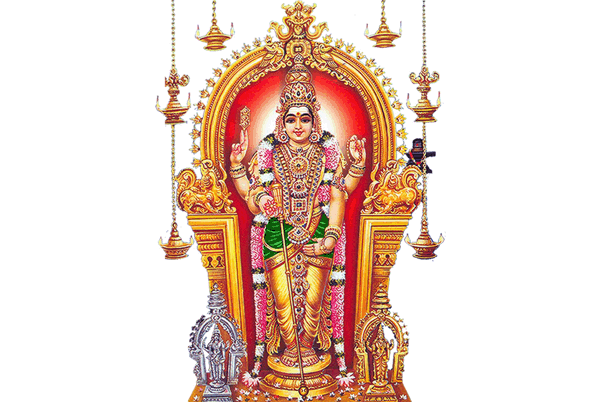
Kandhar Alamgaram: Kandhar Alamgaram, consisting of 102 verses, is a marvellous poetry that portrays Muruga in all His splendour and glory. Apart from being an ornament that adores Muruga, Kandhar Alamgaram describes the various qualities of Muruga, His benevolence, his knowledge, his valour, the power of his weapon, the Vel, the peacock his transport and rooster, his ensign. In the beginning, the poet says: “Siva, the Lord whose hairy head is the source of the sacred river, where rests the great serpent and the sign of half-eclipsed moon, the head that wears different kinds of garlands, is the Supreme Lord of the Universe. How can I describe the infinite compassion of Muruga, the son of such a God as Siva, who has showered his love to a person like me who has not done any Tapas or Puja to qualify His grace?” (Petrai Thavam). Every verse of Kandhar Alamgarm is unique in its description of Muruga. In one verse, Arunagirinathar says: “Oh Lord, who resides in the divine hill of Tiruchengodu, who radiates the light of knowledge, whose holds the sharp-edged weapon of Vel, I always cherish your thoughts in my heart.”
In the hymn starting “Senthanai Kandanai (72)” he prays that there will be no downfall for those who worship Tiruchengodu Velavan and the Lord would bestow them a life of happiness and prosperity. In another song (Malon Maruganai 90), Arunagirinathar says: “Oh Lord Muruga, the son-in-law of Lord Vishnu, son of Lord Shiva, the connoisseur of the divine art of dance at the Court of Devas, the Lord most adored and worshipped by Devas, the epitome of knowledge, who resides at Tiruchengodu, the abode surrounded by lush green paddy fields and lakes, how fabulous and magnificent you look!. Even if Lord of Creation, Brahma, has endowed me with four thousand eyes, it would not be sufficient enough to see and admire your majesty and splendour to my heart’s content. Here, we take a look at just one verse from Kandhar Alamgaram which show how Muruga guides his devotees at every stage of their lives and leads them to their right destination;
Vizhikku thunai Thiru Men Malar Padhangal Meimaikundram
Mozhikku Thunai,Muruga Enum Namangal Munbu Seitha
Pazhikku Thunai, Avan Paniru Tholum Bayantha Thani
Vazhikku Thunai, Vadi Velum Sengodan Mayooramume.”
Vizhikki Thunai: What we see through our eyes, what we hear through our ears and what we feel through our senses are unreal. Vedanta gives the example of a man walking in the veil of darkness and mistaking a rope lying on the road as a snake. It is only when someone puts on a light; he realizes that his perception was wrong. Similarly, the eyes merely make an object visible, but they do not reveal what the object is exactly. It is the inner eyes which gives the correct vision. We need someone to give us this inner vision. We need someone to light a torch and tell us what is real and what is not. Who else can give us this vision than Muruga?
Mozhikki Thunai: Words that normally come from mind cannot be the true expression. True expression is one which comes from heart and the language which the heart speaks is the language of silence. Silence alone speaks truth. May Lord Muruga guide us to speak the most effective language; the language of silence.
Pazhikki Thunai: The word ‘Karma’ denotes action. An action done with a motive invites adverse consequence and becomes Karma Vinai. It is the Karma or the necessity of bearing its consequence that brings one back to this life again. If he is going to add up his Karmas, it would become a chain reaction, leading to the cycle of birth and death. One may have done some Karmas out of his ignorance in the previous birth and it is the grace of Muruga that can liberate him. Arunagirinathar prays that the names of Lord Muruga (Muruga Enum Namangal), like Kanda, Kadamba, Kartikeya, Karunakara and Kumara would ward off all consequences arising out of Karma and lead the devotee to the Lotus feet of Muruga.
Vazhikki Thunai: One passes through different roads in his life time and the passage is invariably smooth, but there is one road which he has to pass through ultimately and that is the dreadful road, the lonely road and the dark road, the road that leads to death. It is the dark road where there would be no companion or guide. Here, Arunagirinathar prays for the grace of Muruga by which he would find the passage smooth. In the Vel Vakuppu, Arunagirinathar prays: “As I walk through this lonely path, may the Vel (spear) of Muruga accompany me on my left and right and give me solace, courage and protection”.(Thanithu Vazhi Nadakkumena…)
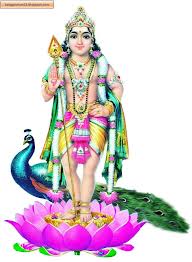
Vakuppu: Among the 18 Vakuppu hymns which Arunagirinathar composed, the first one is Seerpatha Vakuppu which shows how important it is to seek the Lotus Feet of Lord Muruga. Here, he says: “Let me aim at liberating myself by seeking the feet of those sages who have transcended the world of attachments, who symbolize the Vedic mantras and who ever remain in Siva Yoga.” (Udalum udal uyirum…..3, 4). In another stanza, he says: “Struggling in the ocean of Samsara, I am carried away by the strong waves of family and caught in the swirling water of birth and death. Your sacred feet alone would serve as a steady raft to reach me to the Lotus feet where Devas bow their head. ( (Uravumurai manaivi…7, 8) It is believed that one who seeks the Lotus Feet of the Lord becomes free from fear of death, free from the effects of Karma and attain immortality (Amritatvam).
In the concluding lines, he says: “I seek the Lotus Feet of Muruga whose spear has shattered the Krownja Mountain and the heat emitted by it made the ocean turbulent (Madiya Malai 29). “I seek the Lotus Feet of Muruga who holds the powerful Vel, the Lord who resides at Tiruthani the holy place where three different flowers bloom at three times” (Muniyum Vadivelan..30). I seek the Lotus feet of Muruga who is the son of Bhavathi, the source of wealth, fame, knowledge, courage and vairagya (detachment), son of Madhura vachani who speaks the language of sweetness, Bairavi, who is beyond time, Yuvathi, who is ever in youth, Gouri, who is fair as white-ash (vibhuti), Uma, who is the symbol of Pranava Mantra, Trisuladhari, who holds the three sharped weapon, Trisul, Vanasai, who is seated on the lotus, Amalai, who is pure and stainless, who is known as (visayai) Durga, (Madhupati) Kali, (tripurai) the leader of all the three worlds, (punithai), pure, (vanithai) embodiment of beauty, (abhinavai) ever-green, (anagai) and beyond sin. I seek the Lotus feet of Muruga, son of the ever-lasting beautiful Devi, the leader of Kurinji region, who stands witness to all lives, who dispels fears and provides solace and comfort, who permeates the four Vedas, who exudes the benign grace; whose feet alone I worship with reverence.
The Vel Vakuppu describes the power of the Vel which almost reflect the image of Valli. While the broad and pointed portion of the Vel looks like her heavy bosoms, the lower portion of the Vel resembles her slender waist. Arunagirinathar says: “I worship the Vel which broke the strong chain by which Soorapadman bound Indira, the Vel that rescued sage Nakkeerar from the evil spirit, Karkimukhi and the Vel which helped the saints to ward off the ill-effects arising out of Karma. (Surarkku Muni). In the concluding portion, the saint-poet says: “I worship the Vel which did such great wonders and miracles, which belonged to Muruga, the Supreme Lord of Tiruthani, who is unparallel in his compassion, the Lord who resides in the heart of devotees, the leader having the mighty peacock as his transport.”
In the Velaikaran Vakuppu, Sri Arunagirinathar says: “He, who released me from the captivity of my body that came as a result of my karma and he who showed me the way for Jnana and liberation is Muruga, the Lord of Justice. (Ezhayin irattai vinai….12). In his ‘Perutha Vachana Vakuppu”, Arunagirinathar beautifully explains what Maha Vakya stands for. “That which permeates all over the three worlds, where the sun travels, that which is revealed in scriptures, that which causes universal happiness and that which encompasses all is the great verse of truth which Arumuga symbolizes. (Arukkan Ulaviya jaga…). One may have done many acts, out of ignorance, either in earlier birth or in this birth, but whatever the nature of action, he has to suffer the consequences of it. However, there is hope for one who chants Pazhani Vakuppu with devotion as the grace of Muruga would indeed mitigate his sufferings to some extent. Pazhani Vakuppu conveys the prayer that no consequence of karma should come near the devotee. (“Entha Vinayum Anukamale”) and ends with the words “Then Pazhani Murukesane”.
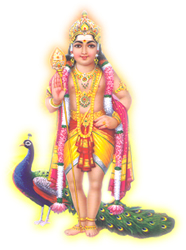
Kandhar Andhati, a set of hymns consisting of 100 stanzas, is remarkable for its many wonderful features. The entire composition of 100 verses of four lines starts with 8 letters: Si, See, Se, Saa, Thi, Thee, Thei, Theey. Besides, all the four lines start with same word, yet each word carry different meaning. Another notable feature is that the same first letter of the ending word of a stanza is used as the first letter of the beginning word of the new stanza. Andhati refers to the eternal reality (Param Porul) which has no beginning or end. The saint has composed the Andhati in chaste verses that portrays the magnificent divine qualities of Lord Muruga. Here, the 54th stanza of Kandhati is given. It is composed only by using the root word ‘th’. Unless one is extra-ordinarily brilliant in Tamil literature, it is very difficult to comprehend the above passage which appears as the 54th stanza of Kandar Anthadi, composed by Arunagirinathar.
“திதத்தத்தத் தித்தத் திதிதாதை தாததுத் தித்தத்திதா
திதத்தத்தத் தித்த திதித்தித்த தேதுத்து தித்திதத்தா
திதத்தத்தத் தித்தத்தை தாததி தேதுதை தாததத்து
திதத்தத்தத் தித்தித்தி தீதீ திதிதுதி தீதொத்ததே”
The background in which Arunagirinathar composed this song is very interesting. Villiputhur Alwar was a scholar of high repute. Though he was the recognized poet in the court of the King, Varapathi Atkondan, he was too proud of his accomplishments. He used to go to different royal courts and challenge the Tamil Pundits there for a trial of talent. He came to Tiruvannamalai, met the king there and challenged whether there is any poet in the town who can match him. He laid down the rules that there would be a trial of talent between him and any other pundit where both would render song and the other one should be able to explain it. Alwar also put up a strange condition that the pundit who failed to explain a song should pay the penalty of his ears being cut. Arunagirinathar accepted the challenge, heard the song rendered by Alwar and successfully explained its meaning. When his turn came, Arunagirinathar rendered the 54th stanza from Kandar Anthadi comprising the letters ‘Thitha’ ‘Thatha’. Villiputhur Alwar could not make out anything from this song and he meekly conceded defeat. Arunagirinathar then explained the meaning of the song and said that he would not insist on the penalty clause. This trait of forgiveness earned Arunagirinathar the title ‘Arunagiri for Compassion’. (Karunaikku Arunagiri). The other title he received was ‘Vakkukku Arunagiri’ (Arunagiri for letters). The meaning of the song as explained by Thiru Muruga Krupananda Variyar is given below:
திதத்தத் தத்தித்த – “திதத்தத் தத்தித்த” என்னும் தாளமானங்களை,
திதி – திருநடனத்தால் காக்கின்ற
தாதை – பரமசிவனும்
தாத – பிரமனும்
துத்தி – படப்பொறியினையுடையதத்தி – பாம்பினுடைய
தா – இடத்தையும்
தித – நிலைபெற்று
தத்து – ததும்புகின்ற
அத்தி – சமுத்திரத்தையும் பாயலாகக்கொண்டு
ததி – தயிரானது
தித்தித்ததே – தித்திக்கின்றதென்று
து – உண்ட கண்ணனும்
துதித்து – துதி செய்து வணங்குகின்ற
இதத்து – பேரின்ப சொரூபியான
ஆதி – முதல்வனே!
தத்தத்து – தந்தத்தையுடைய
அத்தி – அயிராவதம் என்னும் யானையால் வளர்க்கப்பட்ட
தத்தை – கிளி போன்ற தெய்வயானைக்கு
தாத – தொண்டனே!
தீதே – தீமையே
துதை – நெருங்கிய
தாது – சப்த தாதுக்களால் நிறைந்ததும்
அதத்து – மரணத்தோடும்
உதி – ஜனனத்தோடும்
தத்தும் – பல தத்துக்களோடும்
அத்து – இசைவுற்றதுமான
அத்தி – எலும்புகளை மூடிய
தித்தி – பையாகிய இவ்வுடல்
தீ – அக்கினியினால்
தீ – தகிக்கப்படுகின்ற
திதி – அந்நாளிலே
துதி – உன்னைத் துதிக்கும்
தீ – புத்தி
தொத்தது – உனக்கே அடிமையாகவேண்டும்
Roughly translated, it would convey the following meaning:
Oh Muruga, the Chief of all,
who is worshipped by Lord Brahma,
by Lord Vishnu who rests on the Adisesha snake
in the ocean of milk,
and manifesting as Krishna, drank the curd formed from the milk.
Oh Muruga who is worshipped by Siva,
the Lord who dances to the tune of Thithatha Thathitha
the Lord who serves the owner of Airavadham elephant, Deivayanai,
Oh Muruga, I pray;
before this body is consigned to the burning pyre
bless me to ever remain thinking of you
